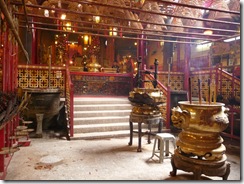
On our way home from Japan and from visiting David, we stopped into Hong Kong for a few days for a break.
I think that this is one of the world’s most exciting cities, although Jill finds the crowded streets and especially the touts around the Star Ferry Terminal at Kowloon to be bothersome. More about that later.
Hong Kong is a great contrast to Japan. No longer are we in a country that has formal rules and structures for people living in dense proximity. Gone too are the million and one safety and courtesy warnings that are so prevalent everywhere in Japan. Here, you are on your own – there is no sign of a paternalistic society that feels obliged to help you care for yourself. We are no longer in a country that is so obsessed with cleanliness that you have to change your house slippers to go the toilet, or have food wrapped in three or more layers of wrapping before you bring it home from the supermarket. Hong Kong, instead, has a blatant feeling of brashness, urgency and jostle.
This is a business centre of the world – easily seen by the number of westerners in business suits, the frequency of people meeting over coffee and the number of expensive cars parked in the street. Not just BMW’s and Mercedes, but Bentleys and Rolls Royce’s. Status here is determined by money. We stayed on the business club floor of the Marco Polo hotel and it was easy to see men and women returning in the evening from a day at the office and using the free WiFi connection in the lounge to catch up with emails and life at home. I have done the same thing dozens of times. In the residential areas where expatriates live, bars and restaurants provide a social hub and a place of simulated normality.
Local people live in a high-rise world. In the business districts, there may be two or three floors of shops at street level and then a series of residential floors with small apartments. Bamboo washing poles hang from the semi-open windows with an assortment of clothes hanging out to dry. In the suburban housing estates, densely assembled blocks of apartments over thirty stories high are clustered together like dominoes on end. You could easily imagine them all falling over in a series if one of them were to topple.
Extensive shopping arcades in the tourist areas are full of designer shops which, in our current economic crisis, are mostly empty of customers. Being a shop assistant in one of these stores must be a very boring life. The shops in other areas are crammed with things that are essential to local people’s everyday living. There seems to be a telephone store on every corner
The best way to see the real Hong Kong is too get out of the tourist areas. Even catching the MTR a station or two up the line is enough to see a very different world. You may ascend to ground level in the middle of a street market. or sometimes in an area where shop keepers sell plywood or cut and shape metal to size in small street front workshops.
Of course it is possible to see some great parts of Hong Kong from above ground as well. The buses and trams are inexpensive although my favourite ride is the trip across the harbour in the Star Ferry. For about 50c, you get a ride across one of the busiest waterways in the world, an impressive backdrop of tall buildings and the sounds and smells of a ferry boat as it bobs across the harbour. Just walking around this city is full of intrigue – you’ll pass a shop selling dried fish or exotic herbs, a temple with incense burning before the deity or view a steep and narrow little passage that leads to some undefined place. Along with these sights are the smells.In one place is the aroma of Asian spices, in other is the perfume of the designer store and in other the stench of garbage from the gutter in the alleyway
Specialist areas provide shops that sell song birds in little cages, flowers, goldfish or just a little patch of park for a sitting area where grandmothers can meet and gossip.
The main down-side of Hong Kong is the open area in Kowloon near the Star Ferry Terminal. To get to anywhere on the ferry it is necessary to run the gauntlet of two groups that the government would do a good deed in eliminating (if it is really concerned about attracting tourists). The first are the touts (mostly Indian) who confront every tourist walking through the area touting for tailor shops and copy watches. The second, almost as bad, are the British backpackers who impose them selves on every Western person walking past, asking them to participate in a survey that ultimately leads to a hard sell tour pitch. Their is no way of avoiding these people; the one thing to do is never to make eye contact with them.
Samuel Johnson, the creator of the English dictionary said ” The man who is tired of London is tired of life itself”. The same holds equally true of Hong Kong.














